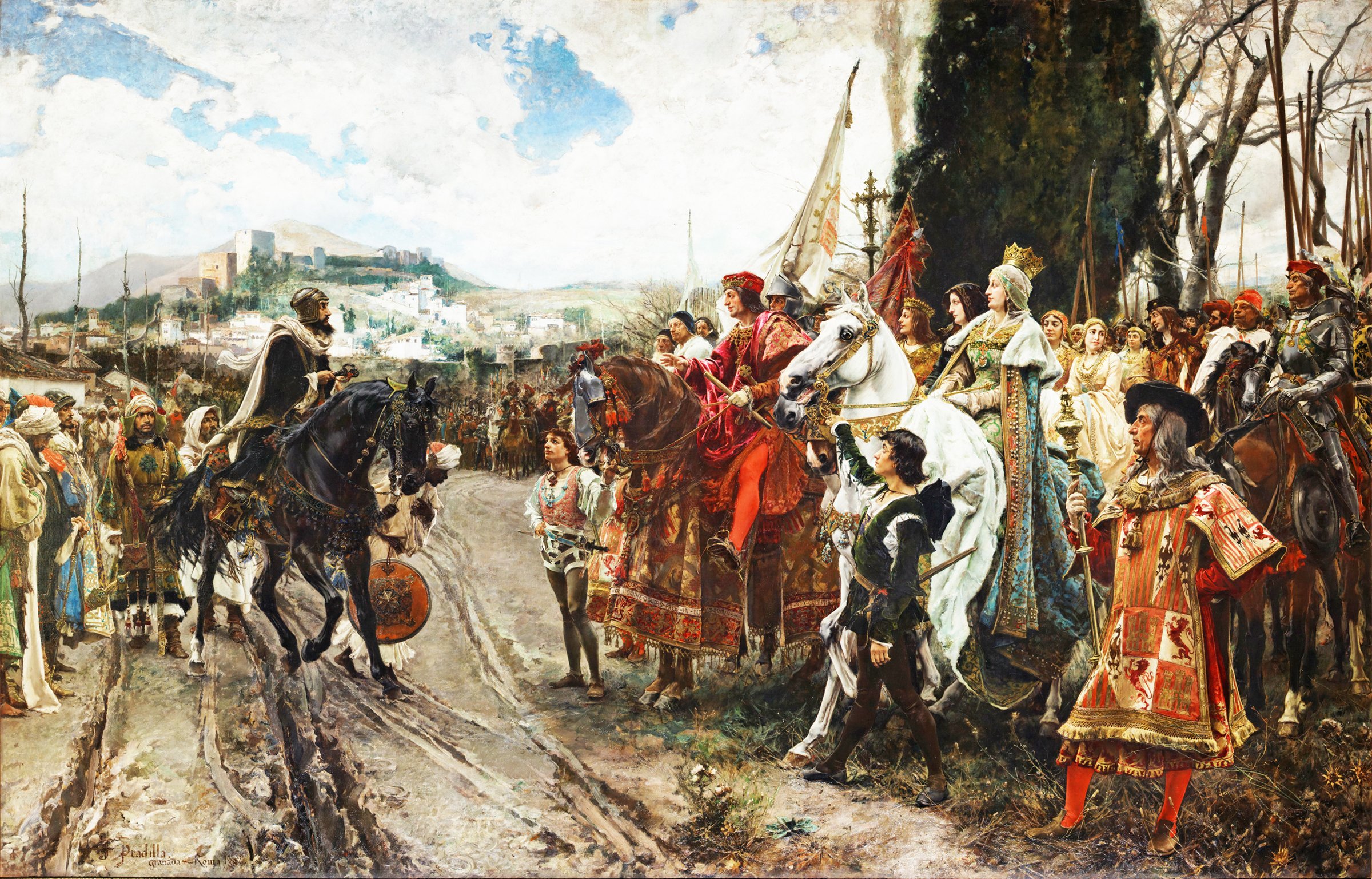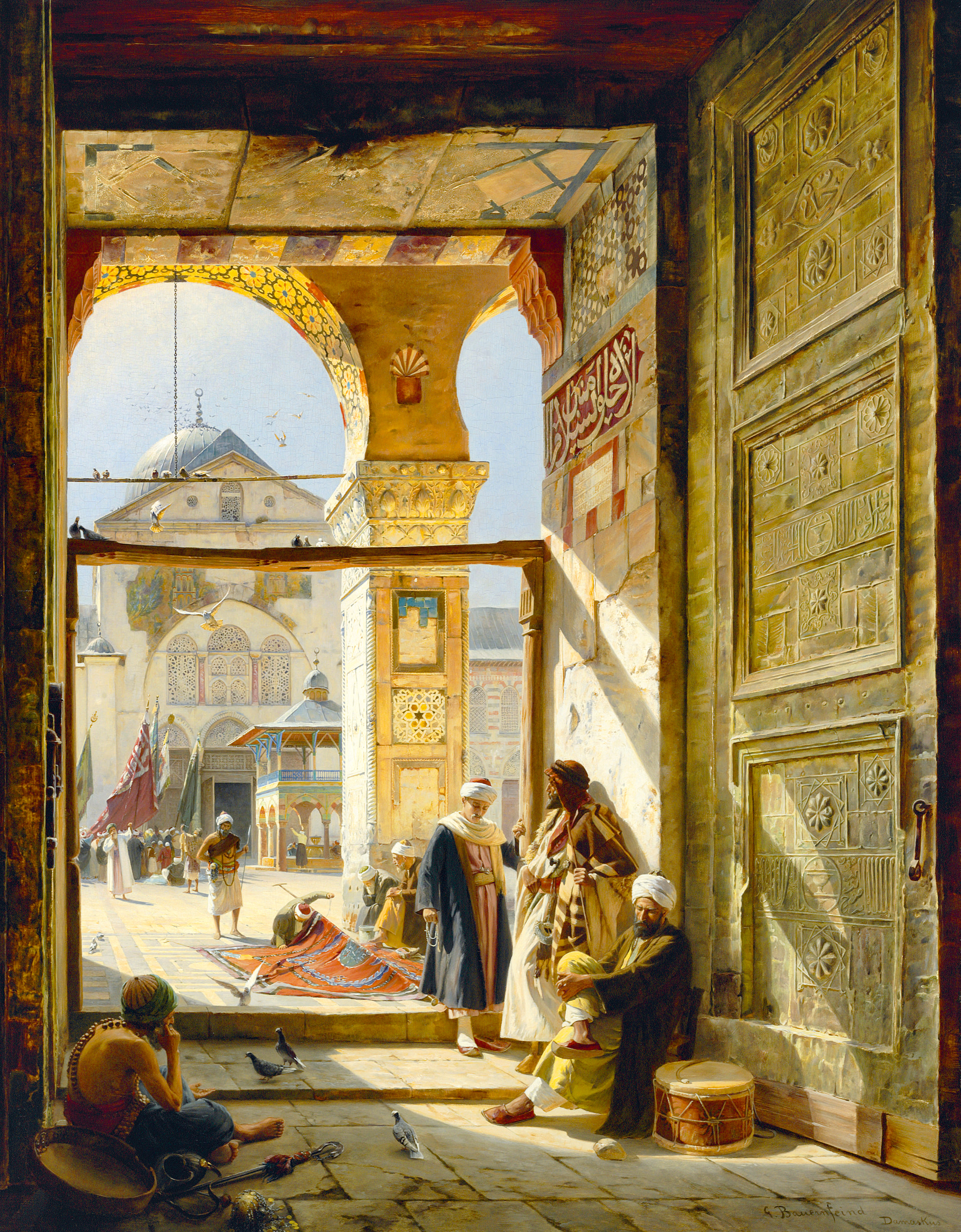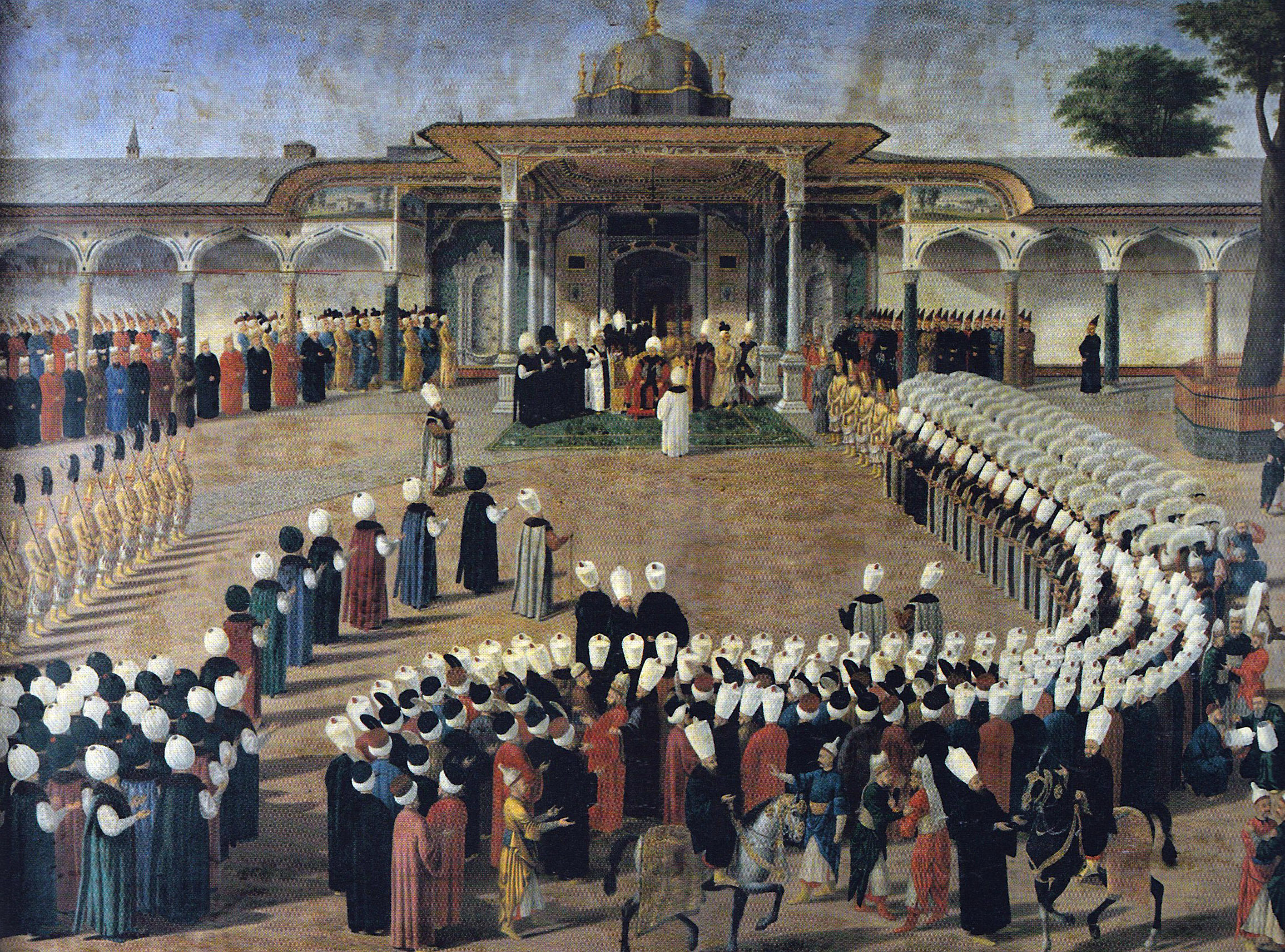
The Capitulation of Granada, Francisco Pradilla Ortiz, 1882
The so-called crisis of authority in modern Islam is not a new story. Arguably, this term might serve as a shorthand definition of what modernity is in general, never mind for Islam.1 But it is no less true that these seem like acutely fraught times within the global Islamic public sphere. It is a question of the clash of authority not only between traditionally trained religious scholars and others claiming to speak for Islamic norms and doctrines but also among the ¢ulemā’. Admittedly, the issues that tend to divide religiously committed Muslims most predictably are political rather than narrowly theological. But certain political disputes today can seem to carry the consequences of some of the notorious doctrinal disputes among early Muslims: affiliation (al-walā’) with the like-minded and near absolute disassociation (al-barā’) with those on the other side.
The issues that can carry these stakes are familiar to anyone. Within the United States, cooperation with the government on projects funded by the notorious countering violent extremism (CVE) program, or anything associated with the Trump administration, can render certain Muslims beyond the pale in the eyes of others. Perhaps you can pray with them, but you should not share a platform with them, and their arguments need not be refuted without their prior repentance. In terms of geopolitics, alignment on either side of the United Arab Emirates/Saudi versus Qatar/Turkey axes can carry similar stakes. Being on the wrong side is not a matter of political judgment (ijtihād) subject to reasonable disagreement (ikhtilāf) but rather a matter of maliciousness toward the ummah itself that requires disavowal and repentance.
But the latter often presents itself not only as a geopolitical dispute over the conflicting interests of two different blocs of states but also as a deep doctrinal dispute over the correct political vision espoused by Islam and the proper balance between political commitments and individual spiritual perfection. One side holds the other accountable for the brutally violent counterrevolution in Egypt and ongoing antidemocratic interference in other countries, including lobbying to list certain Muslim civil society organizations in the United States as “terrorist” groups. The other side claims that obedience to rulers and scholars in political matters is the classical position in Islam, that Muslims should see government not as tyrannical but as a “gift,” and that “democracy must not become a call in certain societies for civil war.”
What I am interested in here are the competing claims about the status of democracy as a value for pious, religiously committed Muslims. When should the claims of democracy or representation be seen as the measure of legitimacy and obedience-worthiness for a Muslim government? In this essay, I am not concerned about resolving this question for Muslims of conscience. Rather, I want to ask the question “What would it mean for democracy to be a deep commitment for religious Muslims?” It is true, of course, that if democracy is a deeply held value or commitment, it is also a newly held value. But it does not follow that the intellectual justifications for it must be shallow or incoherent. In fact, many Muslim intellectuals throughout the twentieth century collectively produced a fairly sophisticated theory of what it would mean for a state to be both Islamic and democratic. I will explore the path to that theory and its most compelling features in this essay, as well as the intellectual and social conditions of its possibility that might point to the challenges for bringing it to life. Like all ideal theories, the vision of an “Islamic democracy” is unlikely to be realized the way its theorists portrayed it, but it nonetheless has something to teach us about the strivings of many modern Muslims to be both free and governed under the canopy of the divine law.
No political concept enjoys universal agreement about its precise meaning and importance, and democracy is no exception. But we can begin with a weak, or thin, conception of democratic rule. We might say that a regime is democratic when the following are true: rulers do not claim to rule by divine right or their own might but by some consent of the people whom they govern; consent can be given either explicitly or implicitly but, in either case, can be revoked; legitimate rulers govern not only by consent but also through institutionalized forms of consultation; and political power is not absolute and unconstrained but is divided and checked by a combination of laws, competing institutions, and informal norms.
I would submit that this thin conception of democracy admits to wide acceptance by Sunni Muslims. While classical Sunnism did tend to recognize the authority of rulers who came to power through the sword, the normative doctrine was that rulers are (s)elected by a group of elites known as “the people who loose and bind” and acquire legitimacy not from divine appointment but from those representatives’ vow of obedience (bay¢ah). Once in power, rulers are not true sovereigns. Their power is not absolute but rather is constrained by both law and morality. They themselves are not the sources of the law’s authority but are at most the guardians of the law’s execution. And decisions or policies they make in their own authority must be arrived at through consultation and are only justified if they plausibly advance the community’s welfare or public interest (maślaĥah).
Podcast: Power to the People? with Andrew March

The Gate of the Great Umayyad Mosque in Damascus, Gustav Bauernfeind, 1890
We might put a principled gloss on this. Islamic states are ruled by two kinds of rationales: text and maślaĥah. Ideally, they do not conflict, and any tensions between them are harmonized. But what if they do conflict? What is the supreme, sovereign reason of power in Islam: text or maślaĥah? When the two conflict in specific moments, which rationale trumps the other? As often as not, it might be maślaĥah in the moment. Now, if maślaĥah in principle can stand above text for purposes of judging what ought to be applied and enforced in any given moment, and maślaĥah is not the sovereign preserve of the ruler but of the so-called people of consultation (the ahl al-shūrā, who, as we established, may include the people more broadly), then are not the people in some way authorized to also speak about the application of fiqh in contemporary circumstances? This is one way in which, even if we accept the classical dualist framework of siyāsah shar¢iyyah, the people’s judgment of their own maślaĥah might be superior to the scholars’ knowledge of text (fiqh) in specific moments of application and enforcement.
Second, in modernity, not only the supreme authority of fiqh but also its autonomy and distinction from other kinds of law or policy are hardly something we can take for granted. Since the nineteenth century, fiqh has been codified, and thereby transformed (some would say disfigured) by a variety of actors—from rulers to bureaucrats to jurists to civil society activists. Moreover, the very boundary between fiqh and siyāsah, between text and maślaĥah, blurs. If the shariah serves the people’s welfare, then maślaĥah is internal to the shariah. If the people’s welfare is willed by God, then the shariah is also internal to maślaĥah. What if, in modern states, the very distinction between fiqh and siyāsah breaks down and we are left with a unitary public juridical-political sphere in which all law must be both “compatible with the shariah” and “compatible with maślaĥah?” And if the people are both the source of legitimacy for all public actors and part of the people of consultation, then might the people at large not be in some way also the legislative sovereign in a modern Islamic public order?
Al-Ghannūshī holds that a properly constituted Islamic state should guarantee that a body of top-level jurists supervises the state’s legislative outputs. But this expert knowledge does not represent sovereign control: “When it comes to the legislative consultation aiming to express the ummah’s consensus on important issues, it should be carried out by a body elected by the people, independent of the state, and composed of some of the best Islamic scholars and judges. Because everyone is allowed to gain knowledge of the shariah and it is not limited to any class of people, there is no reason why the jurists should be those who rule the Islamic state.”5
Moreover, al-Ghannūshī writes that the acumen and judgment to figure out what is clear and fixed in the text, and thus what constitutes “obedience to a creature in disobedience to the Creator,” belongs to all ordinary Muslims, individually and collectively. God’s sovereignty is embodied in the text and law, but also in the popular judgment and interpretation that percolate throughout a Muslim society.6 Importantly, this popular right to engage directly with the interpretation and making of law is limited neither to matters of personal piety nor to public matters of a secular nature. It also extends into the interpretation and application of the divine law. Al-Ghannūshī refers to the ummah as “the source of legislation” and notes that while God is the primary and original source of legislation, the ummah participates in divine will through its public practice of mutual consultation. Moreover, for all the binding and constraining quality of God’s eternal law, “the goal of the eternity of this final, sealing law required restricting and limiting the text of revelation to a determination of general principles and a few select particulars for organizing human relations and economics.” The revealed law leaves the “filling out of the details of that framework to the legislative efforts of the ummah, developing with time,” a practice that al-Ghannūshī equates with the idea of universal communal consensus (ijmā¢) as a source of divine law alongside revelation. This fact induces al-Ghannūshī to proclaim that when deliberating about political matters, “the ummah is guided by God and acquires from His light protection against collective error.”7
The distinction between divine and popular sovereignty seems to blur in al-Ghannūshī’s telling. The search for a kind of collective consensus “in the Islamic shariah is dignifying man as he is.”8 The call for this communal consensus is a clear invitation to recognize public opinion across all its differences, directions, tendencies, and inclinations within the process of legislating. And here the fusion of the divine and popular takes on a poetic character. “This human element that entered into the shariah is part of it…. It is no wonder if the ummah appears with God’s light or its viewpoint appears as part of prophecy and the good is what it sees as good.”8 There is an attempt, thus, to portray the human element of lawmaking not as alien to the divine but as part of it insofar as God’s sovereignty is embodied not only in text but also in the ummah’s public reasoning. He writes that “the human element and the shariah are of one essence, for isn’t humanity infused with God’s breath just like the shariah? Does the ‘seal of prophecy’ not mean the rule through humankind’s own self-guidance and capability in steering the ship of his life by himself in light of the general rules for behavior [laid down by God]?”9

Ottoman Sultan Selim III before an audience in front of the Gate of Felicity
In addition to the fusion of the divine and the human, there is also an attempt to fuse the individual and the collective. The absence of a self-constituting body of “priests” implies a certain measure of direct, individual responsibility to engage with revelation. But the legislative dimension is most fully expressed at the collective level. Al-Ghannūshī refers to the public, political process by which the people at large interpret, determine, add to, and renew the shariah through the use of individual and collective reason as the moment when the “ummah’s personality is recognized as expressed in a specific period of time and its public will to complete the law…. Muslims, then, decided long before Rousseau and his ilk to speak about the general will and to praise it, meaning that the people’s will is free from error, as it comes from God’s will, which made it a source of legislation, even if in the end it relies on the Qur’an and Sunnah.”8 The caliphate of man is fulfilled collectively when the community of deputized believers deliberates publicly about the meaning of revealed texts, the genuine interests of the ummah, the circumstances of the age, and the conditions for applying this or that legal norm.
The preceding is a very brief glimpse into a much thicker vision of Islamic democracy. In this vision, the people have not only supervisory control over their rulers but also custodianship over the realization of the divine law in particular social circumstances. But what kind of people might be capable or competent to govern themselves in this way? It is very clear that this kind of ideal theory of an Islamic democracy presumes a people who are morally united around their ultimate purposes and commitments, are possessed of high levels of moral virtue in their political action, and are capable of collective public deliberation about both the common good and the meaning of the shariah.
Needless to say, these conditions are not only ideal but hard to even imagine in modern times. Leaving aside the corruption and oligarchy that plague almost all states, a harder point for many to acknowledge is that Muslim-majority societies are characterized by the same fundamental challenge of pluralism as are other modern societies. Because the Islamic democratic vision of self-rule involves a very deep kind of consensus about metaphysical truths and the ethical purposes of human life, if such deep moral agreement is no longer likely in the contemporary world, at least without the kinds of coercion and limitation on freedoms of conscience and speech that Islamic democrats claim to reject, then it would appear that Islamic democracy is at best an ideal theory that serves as a thought experiment or an aspiration always on the horizon. Indeed, when faced with the realities of democratic governance, rather than ideal theory, al-Ghannūshī personally and his Ennahda Party have made very clear that they do not aspire to an Islamic state or the application of the shariah in any way, renouncing even the legacy of “Islamism” or “political Islam” and instead defining themselves as “Muslim democrats.”
If this more utopian, thicker form of a regime that is fully Islamic and fully democratic seems out of reach, what then should be the regulative ideal by which the legitimacy of Muslim states is judged? This is where some today enter, insisting that democratic aspirations are politically misguided and a distraction from spiritual priorities. Muslims should avoid the great evil of fitnah and not confuse the divine message of Islam with a political creed more akin to Marxism than to the prophetic tradition.